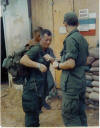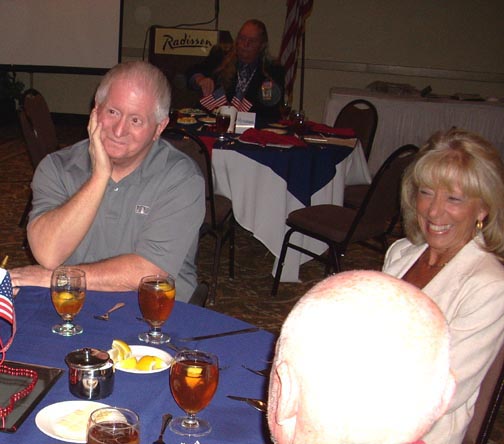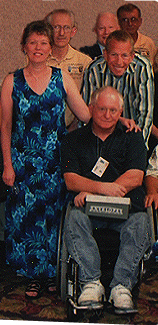|
|
The
"Lieutenant Terry Weaver" Story
Platoon Leader
Second Platoon, Company
B, 3-506th
1968

Second Lieutenant Terry M. Weaver, 24-year-old
platoon leader, 2nd Platoon, Company B, native of Indiana. In the summer of
1966, Terry had graduated from Indiana University and had spent one season
playing minor league baseball. At the end of the baseball season, he was drafted
into military service and reported for duty on August 30, 1966 at Otis Air Force
Base in Massachusetts. Terry took Basic Training at Fort Gordon, Georgia and his
AIT at Fort McClellan, Alabama. Following AIT, he attended Officers Candidate
School at Fort Benning, Georgia. Young second lieutenant Weaver completed his
airborne training at Fort Benning and was awarded his “Jump Wings” in June
of 1968. Shortly thereafter, Terry received orders for Vietnam, arriving in
country early July 1968. He was eventually assigned to the 3-506 as platoon
leader of 2nd Platoon, Company B on July 24, 1968 as one of the many
replacements for those remaining “original boat soldiers” of the battalion
who continued to DEROS upon completion of their tour of duty in Vietnam.
The Currahees of the 3-506 had experienced almost
continual contact with the enemy ever since their initial combat assault on
November 11, 1967. They had persevered through the Tet Offensive of
January/February 1968 continued to face-off with the enemy as the year rolled on
through the summer months. The month of August would be no different. Joint
coordination between TF 3-506 and Vietnamese Forces had inflicted heavy
casualties on the enemy and had denied them access to their usual safe havens.
By constantly keeping the enemy off-balance and “on the run”, combined
operations had greatly reduced enemy strength in the villages and hamlets
throughout Binh Thuan Province.
The first few days of August 1968 saw only light
contact with the enemy. On August 2, the Currahees enjoyed another brief respite
from the battlefield, as they gathered at LZ BETTY for their second USO Show.
The popular singing group, Peaches and Herb, entertained the troops.
In the early hours of August 21, 1968, an unknown-size
enemy force launched a mortar attack on LZ BETTY—one of countless attacks by
the enemy against the Currahee base. Task Force 3-506 knew from experience that
an enemy mortar attack on LZ BETTY was usually a diversion to direct attention
away from “bigger and better” enemy operations. Fortunately, there were no
Task Force casualties, but enemy mortars did manage to take out containers of
MOGAS and diesel fuel, destroying several thousand gallons of valuable fuel.
The first significant contact for the month occurred on
August 24, when an estimated VC/NVA battalion attacked the 3rd Regional Forces
Company approximately three kilometers northwest of Phan Thiet. The next
morning, August 25, the 288th Regional Forces Company engaged two VC/NVA
companies approximately seven kilometers north of Phan Thiet in the vicinity of
Dai Hoa Hamlet. The 288th RF Co. became heavily engaged with the dug-in enemy
forces, and elements of the 3-506 combat assaulted into the area of contact to
assist the ARVN forces in establishing a cordon of the hamlet.
At 1110 hours on August 25, 1968, elements of the 3-506
begin their combat assaults from their PZ to the contact area. The 3rd Battalion
of the 44th ARVN Regiment also moves into position in the contact area. As
Company A, 3-506 lifts off their PZ, the slicks receive enemy fire; and Sgt.
Keith Rowell, 25, from Amarillo, Texas is killed. Once all elements are on the
ground and in position, Captain Knowlton’s Bravo Company takes field command
of the 1/69th Tank Platoon and the 4/8th (APC) Cavalry Troop (ARVN) and all move
to the contact area.
By this fateful day in August, 2 Lt. Terry Weaver had
spent all of thirty-one days in the field as platoon leader of 2nd Platoon,
Company B. He was a confident leader, but barely had his “feet wet” in the
battlefield arena. As his platoon began to move into the contact area along with
the rest of Company B, the enemy launched an unyielding attack on the Task Force
with small and automatic weapons, B-40 rockets, and light to heavy mortars. The
battle was quite fierce—and the enemy a formidable foe, as the mortared the
Currahees from their heavily fortified positions.
Despite the heavy mortar fire raining down on them, the
Currahees of Company B were able to move toward the enemy bunkers quite rapidly
mounted on the APC’s; but were forced to dismount and make their final
approach on foot. Lt. Weaver’s platoon was in the center of the battle as they
approached the fortified bunkers in front of them. It was as if all of the small
arms, artillery, tank, and exploding ammo caches converged at one point. Lt.
Weaver was hit by an enemy RPG.
The fierce “Battle of Dai Hoa” continued will into
the night. A dawn sweep of the contact area revealed that the enemy had escaped
through poorly defended ARVN positions. Vietnamese forces sustained five KIAs
and 41 wounded; the Currahees sustained fourteen wounded. One of the wounded
Currahees—Sgt. Teodorito Rio-Rosario, 23, of Aibonito, Puerto Rico—died of
his wounds the following day on August 26, 1968.
If it were not for Doc Lovy’s excellent medics, Lt.
Weaver would not have made it off the battlefield. He was kept alive thanks to
the grace of God and the skilled hands of the medics. Captain Knowlton recalls,
“Lt. Weaver had only been with the company a little over a month. As most LTs,
he was technically and tactically proficient; but what makes the man and the
leader is his heart. Squarely built, Terry was a committed leader, a team
player, and someone you’d follow to hell and back. He cared, and his men knew
it. That’s why those bunkers and the enemy within them didn’t have a chance.
Second Platoon was coming after them, and Terry was leading.”
Back at LZ BETTY, Lt. Weaver was stabilized by the
Battalion Surgeon and then evacuated to the 24th Evac in Long Binh for extensive
neurological surgery. His wounds had left Lt. Weaver paralyzed at the T-8 level,
with neurological damage also to his left arm and his eyes. From Long Binh, Lt.
Weaver was transferred to Okinawa, where he spent three more weeks building up
his strength for the trip back home to the States.
Terry was ultimately sent for further recuperation and
therapy to Portsmouth Naval hospital, where he spent the next the next seven
months. From there, he went to the VA Hospital in Richmond, Virginia and stayed
until his medical retirement from the military in December of 1969. This was
only the beginning of his long road to recovery.
His father, then a Colonel in the Air Force stationed
in Okinawa, flew back to the States to bring Terry once again to Okinawa. For
the next eighteen months, he traveled back and forth from his parent’s house
to Kue Army hospital for intensive physical therapy and more surgery on his
eyes. Terry finally left Okinawa in September of 1971 and returned to the VA
Hospital in Long Beach, where he learned to adjust to life confined to a
wheelchair.
Terry spent a total of twenty-three months in
recovery/rehab for the wounds he sustained in Vietnam. Even though he does have
a MA in U. S. History and taught one year of high school after leaving the
military service, he is now permanently disabled and retired. Terry currently
lives in Redlands, California with his two cats and three racehorses—CURRAHEE
BRAVO SIX, FAMOUS FLASH, and ELK MOUNTAIN.
Words of reflection from Bill Knowlton, Terry’s
commanding officer in Vietnam—“Who is this man, crippled just shy of
thirty-seven years ago? He is one who visits those wounded in like manner and
like time—those who are now confined to a VA hospital due to failing limbs and
organs. Still today, the doctors marvel at his condition, attitude, and
tenacity. He is the living legacy of what it means to be Airborne, a spirit that
dominates failure, refuses excuses, and is clearly a winner. In that long month
in Vietnam, he instilled within his men that attitude and that desire. I thank
God that I knew him then, and I thank Him now that I can still call Terry my
friend. Bravo 2-6 has more than proven to all who know him that wounds are but
skin deep and will not affect the heart of the man. Thanks, Terry, for who you
are and for the fighting spirit you share with all. Airborne!”

Lt. Weaver at Nashville, TN and our 2009 3-506th Reunion.

Lt. Weaver at Reno, NV 2006 3-506th Reunion with Donna and Jerry Berry, Alex
Simich, Lt. Charles Moseley behind Terry (FO 2-320th Arty.) and Cpt. Bill
Knowlton, B Co. CO (background)

Click the
shield to return to Then & Now Homepage

-----#####----------
|
|
|
|